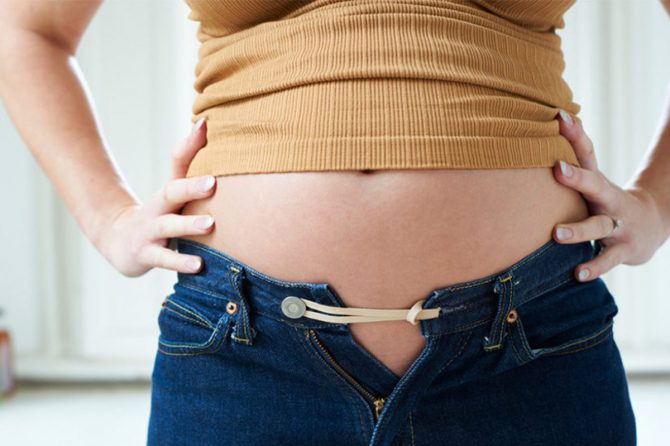
Food Baby Bloat Whenever You Eat?
Do you feel you look 6 months pregnant after eating due to bloating?
Are you nervous to eat certain foods because you’ll ‘blow up like a balloon’?
Abdominal bloating or ‘feeling bloated’ is a very frequent and familiar symptom many people have experienced at some time. There are many reasons for bloating but if it often occurs after eating it could be related to your gut health.
Abdominal bloating or a distended belly may be accompanied by burping, wind, abdominal discomfort and a feeling of fullness after a meal or sometimes after even a few bites.
Although bloating may be caused by serious medical conditions, increased intestinal gas is one of the most common reasons you might be bloated. This is most often caused by the diet and some foods or ingredients you are intolerant to or bowel dysbiosis – imbalance of good gut bacteria.
Causes of excessive gas could be from chewing gum (sorbitol and mannitol), eating too fast or too much. Eating foods that can cause gas in the gut such as legumes (beans and lentils), raw cruciferous vegetables (e.g. broccoli, cauliflower, cabbage, Brussels sprouts, onions), high fibre foods such as whole grains; along with fatty foods, carbonated soft drinks or dairy foods.
Conversely, having too much fibre, too many fermented foods or the wrong probiotics can upset your gut and cause bloating too.
Other common reasons we see in clinic may be lactose or gluten intolerance, IBS (Irritable Bowel Syndrome) and SIBO (Small Intestinal Bacterial Overgrowth). Also constipation, monthly hormonal changes and even high stress can cause bloating.
Though we specialise in looking into gut health at Kissun Clinics Whitsundaysc and conditions that may be affecting optimal bowel function, below is a list of some things to try first to see if these may reduce your bloating:
- See if you can identify obvious foods that cause you to have bloating or gas and eliminate them from your diet. Common ones are gluten grains and dairy foods.
- Reduce or avoid soft drinks, chewing gum and highly processed meals.
- Stay active and exercise to help your digestive system function at its best.
- Eat smaller portions if you feel bloated after overeating.
- Reduce your intake of fatty foods, which can contribute to feeling overly full.
- Eat in a more relaxed, slower way. Remember, it can take up to 20 minutes to feel full after you’ve started eating, so if you eat too fast you can miss the natural body cues to let you know when you’ve had enough.
- Go for a gentle walk after eating to stimulate digestion.
- When adding high fibre foods (legumes or wholegrains) to the diet, do so gradually to allow the body time to get used to extra fibre in the diet.
We like to look into your diet and lifestyle along with testing the state of your gut health, or bowel dysbiosis, through various relevant tests. Food sensitivity testing may also be considered as part of our treatment protocols. We find that testing can more specifically treat your condition with diet modifications and supplements to support your gut, rather than trying highly restrictive diets unnecessarily or incorrectly.
So if you’d like people to stop asking when you’re ‘due’ or would like to eat, especially eat out socially, without needing to wear elastic-waisted tracksuit pants, call now for a consultation on 07 4946 7910 to discuss how we might help you boot the bloat!
Leave a reply